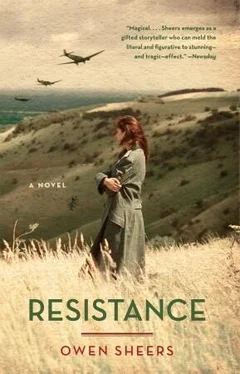It wasn’t always easy for her to find the poet. As long as it wasn’t raining he was nearly always outside, painting, even when the weather got colder. But he kept changing where he painted. Sometimes it was on the slope just below the old monastery. At other times she’d find him down between the two streams, trying to capture their movement, their white water and ferny banks. But she always tried to find him after her delivery, in the hope of another story, or just to spend an hour watching his brush uncover a strange, supple version of the land around them.
Then suddenly the poet wasn’t there. Somehow Sarah had always known that one day he wouldn’t be; that he was as much a product of the season as the tall hay fields or the swallows tying knots in the air. As inconstant and brief as the spring blossom or the long, blood-streaked summer evenings. Her mother had prepared her for his going. “They won’ last long, mark my words,” Sarah had overheard her say to her father. “It’s a holiday for them, tha’ place. Another winter’ll see ’em off, you watch now. Back to their towns soon enough.”
Sarah first told her mother about the poet when she was helping her with the washing, feeding a pile of wet clothes into the wringer while her mother worked the handle. She told her about his stories, about his paintings. She didn’t tell her about his wound. Her mother had frowned down at her, shaken her head, and gone back to turning the handle. “Stories never put food on the table, bach,” she’d said as the flattened clothes emerged from between the rollers. “Work, tha’s what feeds yer. Now, put in tha’ shirt there, will you?”
Her father had been more positive. “No harm in it, is there?” he’d said to his wife when she’d voiced her concern about their daughter spending so much time in a field with a blow-in poet and painter. “Do ’er some good more like. Get out a bit, hear about the world. He was in the war, you know?” Seeing Sarah standing in the door frame, watching them, he’d moved closer to her mother and added in a lower voice. “She misses her brothers, see.”
But then the other stories about the people at the monastery started to come out. Stories Sarah only ever really understood or heard properly years later when she was an adult. Stories about the poet’s friend, Eric Gill, the artist who first brought them all here, arriving as a group in a pony and cart in the middle of a downpour four years ago. About his ways. The stories began in whispered knots of women outside the chapel and spread like gorse fires throughout the valley. Sarah’s mother came home one Sunday and held Sarah against her chest so hard and for so long that Sarah had to push back against her arms to catch a proper breath. Then her mother had asked her questions, a strained look on her face. “No, Mam,” Sarah had replied to the same enquiry asked several different ways but never asked straight. “He jus’ told me stories an’ did ’is paintin’. Tha’s all.” For weeks after that her father kept himself low and quiet about the house, treading carefully around his wife for fear of spilling her boiling anger. “Catholics,” Sarah had heard her mother say over tea with a visiting friend weeks later. “What can you expect?”
So Sarah never got a chance to go back to see if the poet ever returned to his rock in the field. Her mother forbade her to ever go near that end of the valley again, and over the years since, apart from Mrs. Thomas’s brief flush of interest, she’d forgotten the poet and his stories. Until now. Until the captain’s mention of his namesake and its resonance against those diagrams from “The Countryman’s Diary” that had so haunted her these past months. Those sketches and plans of subterranean bunkers, submerged under the earth and peat of the hills. They made her think of the poet and his stories again. One story in particular, about a sleeping lord and his army. There was a king, that’s what the poet had told Sarah one afternoon as he painted by the streams. A Welsh king and his army driven into the hills by Edward I. Beaten, but not killed and not captured, even though no one ever saw him or his army again. That, the poet had explained, was because they’d never come back from those hills. Thousands of men swallowed within the muscles of earth that formed Wales’s natural defences against her invaders. And they were still there. At this point the poet had paused in his painting, placed his brush into a cloudy jar of water, and leant closer to Sarah’s listening face. His voice dropped, so quiet she could barely hear him over the running of the streams. Yes, he’d whispered, still there. In the hills, deep inside them, buried under the peat, heather, gorse, rowan, bog-cotton, stone, and soil. Asleep. Not dead. Asleep. An entire army and their king, sleeping in the hills, ready to wake and defend the country in its hour of need. The sleeping lord and his sleeping army is what the poet had called them and as he’d described them, Sarah saw them: a glimmering seam of armour, chain mail, and swords, just as she’d seen in her history books at school. A rare ore of sleeping men, embedded in the hearts of the hills, waiting.
Had he known then somehow? Had he known that years later, when that little girl was a woman, her husband and all the other husbands in her valley would disappear into those same hills? That they would go underground, deep underground? If that’s where they were. She could hardly remember the pictures in that pamphlet now. Had she really ever seen “The Countryman’s Diary” at all? Why did Maggie have to burn it? So quickly. She’d been numb then, so soon after learning. Why couldn’t Maggie have waited?
Sarah turned over in the bed which still felt too wide for just her body. She was being stupid. All these hours alone. It was a story. A story for a little girl. She was a woman now; she couldn’t believe such things. But she wanted to. Wanted to believe so badly. That Tom and the others would be coming back. To defend the country in its hour of need . But wasn’t that hour already here? German soldiers in her kitchen asking questions, turning the pages of her family Bible, holding her wedding photograph. She was Tom’s country and she was in need. But he hadn’t woken. Tom hadn’t come to her. He was still out there, dumb and unseen, absorbed into the hills’ unending green. And deeper still now, under the snow too. He was sinking deeper from her every day.
She had to remember him. Properly, with all her senses. When she’d held that photograph by the fire this evening, she’d felt nothing. It was just paper in glass, light on paper. She couldn’t even conjure the memory of its being taken anymore. Her memory was the photograph, she saw that now. And that wasn’t enough. Not if she was going to hold on to him, to stop him sinking further away from her through the centuries of soil and earth. She must conjure him, not memories of him. Conjure him, Tom, here, into their bedroom. Like Edith trying to conjure her son back from the dead. But Sarah didn’t need any boards with letters on, any upturned glasses. She had him already, inside her. She just had to draw him up to her again. Draw him up through the layers of her forgetting like stubborn groundwater drawn up into a well.
The first time she saw him. Surely she could conjure that again? The moment she first saw her future husband. As a girl playing on her own in the fields she’d often thought about that man. The man who would be the father of her children, a little boy playing somewhere in another field at exactly the same time, oblivious of their impending meeting. Or maybe he was a young man already working on a farm. For a few months of her schooling, he’d even been an earnest young student bent over his books in a town with spires and old stone buildings. And then after all that wondering, years later she’d finally seen him. It was at a dance in the village hall in Longtown. One of those dances organised by the community to make the young of the valleys, who spent their lives divided by the long fingers of the Black Mountains, mix and meet. The kind of dance at which countless other women in the area had met their own future husbands.
Читать дальше












